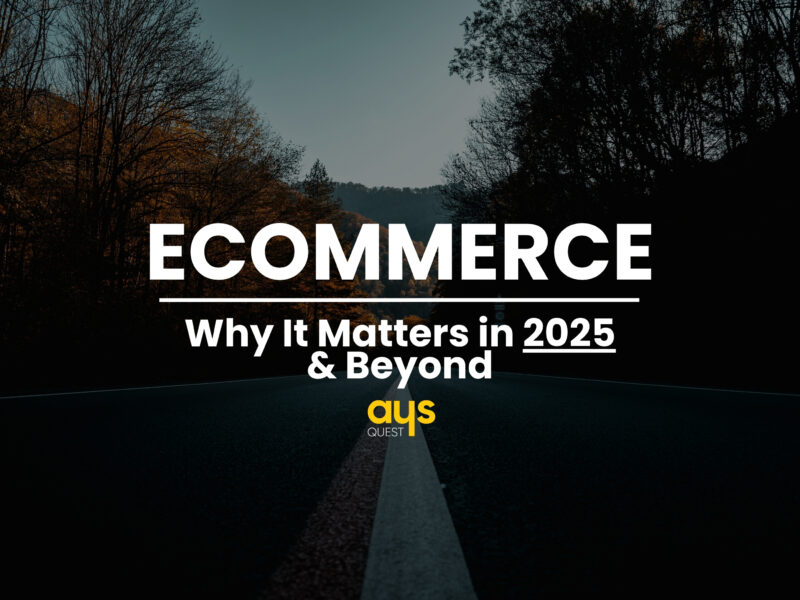The ecommerce industry has experienced explosive growth over the past decade, but 2025 marks a pivotal moment in the digital retail revolution. With changing consumer habits, advanced technologies, and increasing demand for convenience, ecommerce is no longer just a trend—it’s a necessity.
In this blog, we break down why ecommerce matters in 2025 and what businesses must do to stay relevant in this fast-paced, tech-driven economy.
1. Consumer Behavior Has Shifted Permanently
Post-pandemic, consumers have fully embraced online shopping as a default mode of purchase. In 2025:
- Over 2.7 billion global shoppers are expected to make online purchases
- Mobile commerce (m-commerce) is predicted to account for more than 70% of ecommerce transactions
- Consumers demand speed, personalization, and trust
Today’s shopper isn’t just looking for products—they’re looking for experiences, quick checkouts, real-time support, and tailored recommendations.
2. Ecommerce Drives Global Economic Growth
Ecommerce is no longer restricted to major cities or developed countries. It fuels small business growth, promotes cross-border trade, and creates millions of jobs in logistics, marketing, tech, and customer service.
In 2025:
- Global ecommerce sales are projected to exceed $7.4 trillion
- Emerging markets like India, Southeast Asia, and Africa are driving the next wave of growth
- Even traditional industries like farming, auto, and B2B sectors are embracing ecommerce platforms
3. AI and Automation Are Powering Smarter Commerce
In 2025, ecommerce is deeply integrated with artificial intelligence (AI), machine learning, and automation. These technologies are enabling:
- Hyper-personalized shopping experiences
- Smart inventory and order management
- Predictive analytics for better business decisions
- Automated customer service via chatbots and virtual assistants
Retailers that use AI tools for recommendation engines and dynamic pricing see higher engagement and conversion rates.
4. Social Commerce is Redefining Shopping Channels
Ecommerce in 2025 is multi-platform and social-first. Platforms like Instagram, TikTok, Facebook, and Pinterest are now sales channels as much as they are marketing tools.
- Influencer marketing continues to influence buyer decisions
- “Shop Now” features on reels, stories, and live streams convert viewers into customers instantly
- Social proof (reviews, UGC, testimonials) is more valuable than traditional ads
Consumers trust peer-driven content, making social commerce a non-negotiable part of ecommerce strategies.
5. Sustainability and Ethical Practices Matter More Than Ever
Modern consumers want more than just convenience—they care about where products come from, how they’re made, and their environmental impact. Ecommerce brands that focus on:
- Eco-friendly packaging
- Carbon-neutral shipping
- Ethical sourcing and manufacturing
…are winning loyal customers. In 2025, sustainability is a competitive advantage.
6. Omnichannel Is Not Optional—It’s Expected
Consumers expect a seamless journey across online and offline touchpoints. The line between digital and physical commerce has blurred. Successful ecommerce in 2025 is:
- Unified across website, mobile app, physical store, and third-party platforms
- Offering options like click & collect, same-day delivery, or in-store returns for online purchases
- Backed by integrated CRM and POS systems for a consistent experience
7. Ecommerce Enables Small Brands to Go Global
Thanks to global marketplaces, digital marketing, and cross-border logistics, even small or niche ecommerce stores can reach international customers in 2025. Key tools supporting this include:
- Multilingual storefronts
- Currency converters
- International shipping platforms (DHL, ShipRocket, etc.)
- Localized payment gateways like Razorpay, Stripe, or PayPal
This global access helps businesses scale rapidly and diversify their market base.
8. Data-Driven Decision Making is Key
Ecommerce success in 2025 hinges on real-time insights. Businesses must monitor:
- Customer behavior
- Cart abandonment rates
- Repeat purchase trends
- Funnel performance
Tools like Google Analytics 4, Shopify Analytics, and CRM dashboards help optimize product offerings, marketing campaigns, and pricing strategies.
Final Thoughts: Ecommerce Is the New Normal
Ecommerce isn’t just a sales channel—it’s the foundation of modern retail. As we progress through 2025, the brands that succeed will be those that:
✅ Embrace technology
✅ Prioritize user experience
✅ Offer transparency and personalization
✅ Adapt to evolving consumer values
If you’re not online, you’re invisible. It’s time to future-proof your business by building an agile, data-driven ecommerce strategy.





